A.I. ARTIFICIAL INTELLIGENCE: A Dark Sci-Fi Fairy Tale Decoded
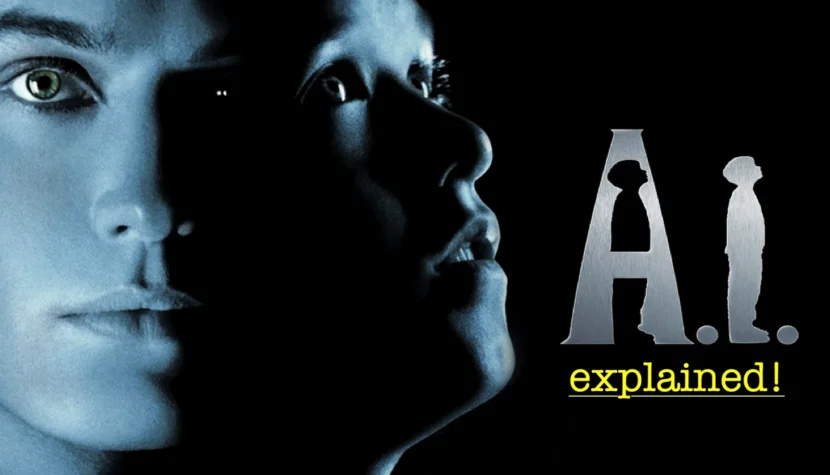
Initially, Stanley Kubrick was supposed to direct it. He acquired the rights to adapt Brian Aldiss’s short story Super-Toys Last All Summer Long in the early 1970s. Aldiss was the first of five people Kubrick commissioned to create a screenplay (besides Aldiss, Bob Shaw, Ian Watson, Arthur C. Clarke, and Sara Maitland also worked on the adaptation over more than a decade). Constant reshuffling among close collaborators, aimed at achieving cinematic perfection, was a regular occurrence for the creator of A Clockwork Orange.
The Tale of Humanity That Ceased to Be Human
The darker interpretation of A.I. Artificial Intelligence I propose is based primarily on Werner Faulstich’s assertion about the nature of science fiction cinema: Every genre has its prototypical star, only the sci-fi film, structurally and ideologically, deviates from this principle as much as possible: its protagonist is humanity. If humanity is the veiled, main character of Spielberg’s film, then David should be seen as a litmus test of human morality—a figure exposing the future civilization to an ethical challenge, which it fails, to put it mildly.
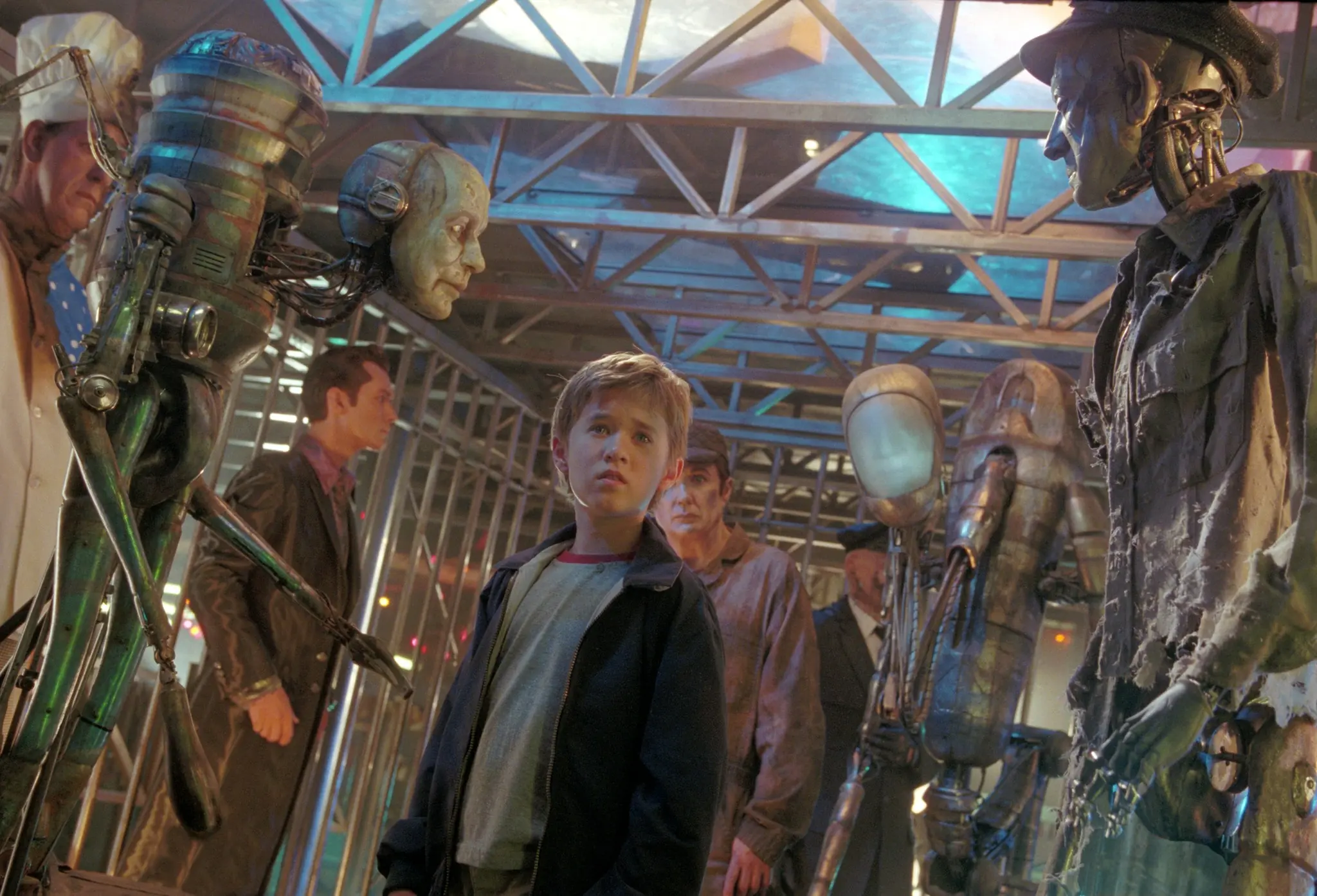
A.I. Artificial Intelligence begins with a brief prologue where an omniscient narrator introduces the audience to the film’s world, describing the state of the planet in the 22nd century: The greenhouse effect melted the ice caps, flooding hundreds of cities. Amsterdam, Venice, New York—gone forever. Millions were displaced. The climate went mad. In poorer countries, hundreds of millions starved. In the developed world, life was comfortable, but only those with a license could conceive. That’s why robots, who didn’t consume resources after production, were so crucial to societal prosperity.
Spielberg’s world is one of a slow-moving apocalypse caused by irreversible climate change. It’s a world at the end of the Anthropocene, a new (from a contemporary perspective) geological epoch, which Ewa Bińczyk characterizes by:
an unprecedented degree of human alteration of planetary systems, leading to irreversible losses (ocean acidification, the loss of coral reefs, irreversible soil degradation), a loss of biodiversity, and the crossing of additional planetary boundaries. The most serious environmental, political, and existential challenge of the Anthropocene is considered to be the risk of climate change. This risk was triggered by human activities during the industrial age: greenhouse gas emissions, deforestation, animal husbandry, and the burning of fossil fuels in transportation, energy, and industry.
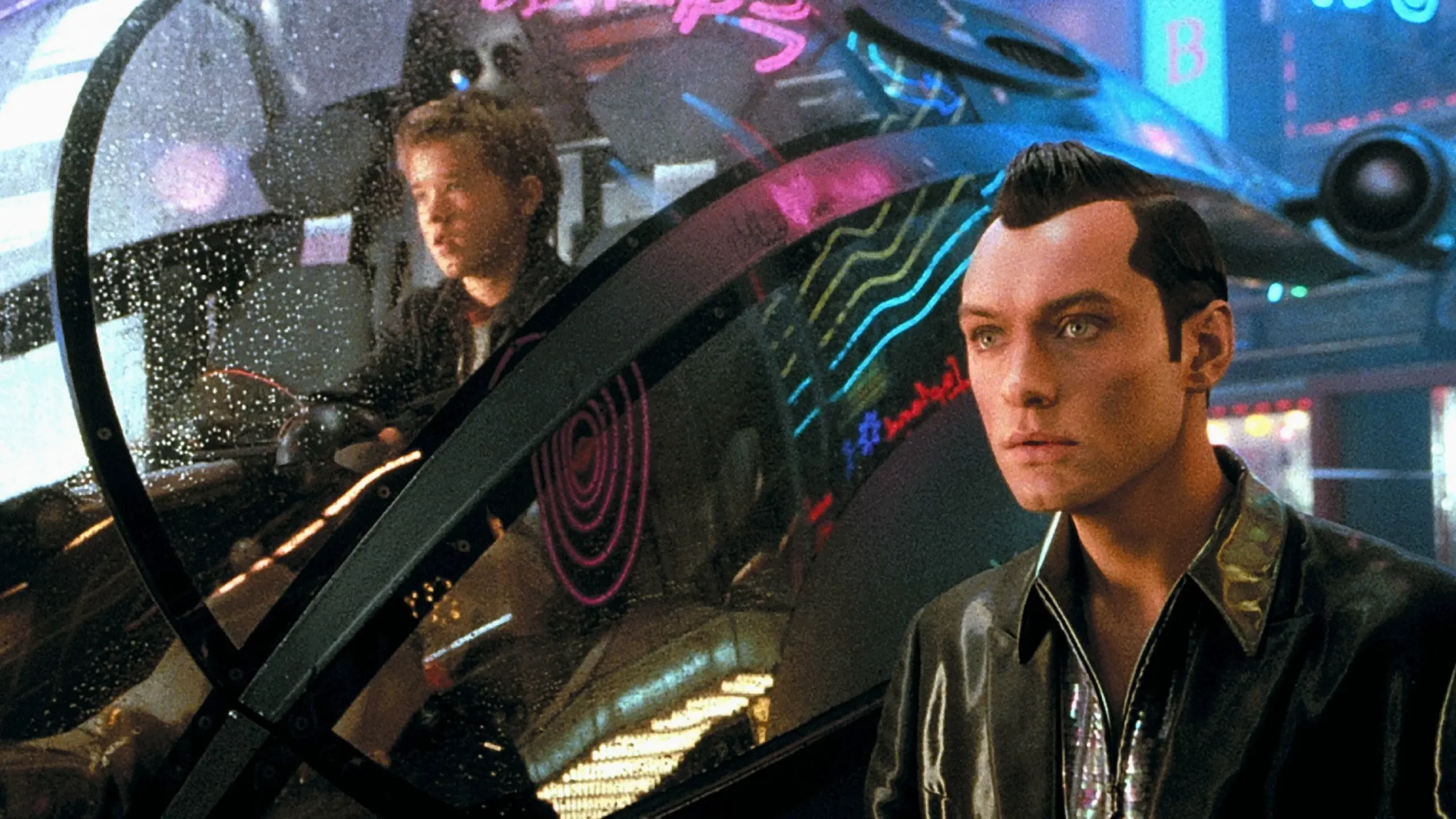
Interestingly, the themes of civilization’s end and overpopulation, unlike the fairy-tale elements, are also present in Brian Aldiss’s short story. During a company event, Henry repeatedly mentions the “burning issue of overpopulation” and government restrictions on reproduction. When describing the Swintons’ apartment, the narrator notes that it is: half a kilometer above the ground. Built into other apartments, their unit had no windows facing outside; no one wanted to see the overpopulated world outside.
Much like in the story, the Swintons in the film also live in a sort of bubble, insulated from the problems of the outside world. They belong to a privileged elite that can maintain a high standard of living, untouched by the unfolding climate disaster. They have a large, well-furnished suburban home, a spacious garden with a pool, a modern car, and access to the latest technological gadgets—they are, after all, the first to receive David, a prototype robot capable of developing human emotions. The Swintons live unreflectively, day by day, not sparing a moment’s thought for what’s happening beyond their environment. In other words, the film is as much about the trajectory of neoliberal present as it is about a future in which global elites hide away in protected enclaves while masses of poor, illegal immigrants live in wastelands. However, their elite status cocoon means little, as they will soon share the fate of the rest of humanity—they will perish.
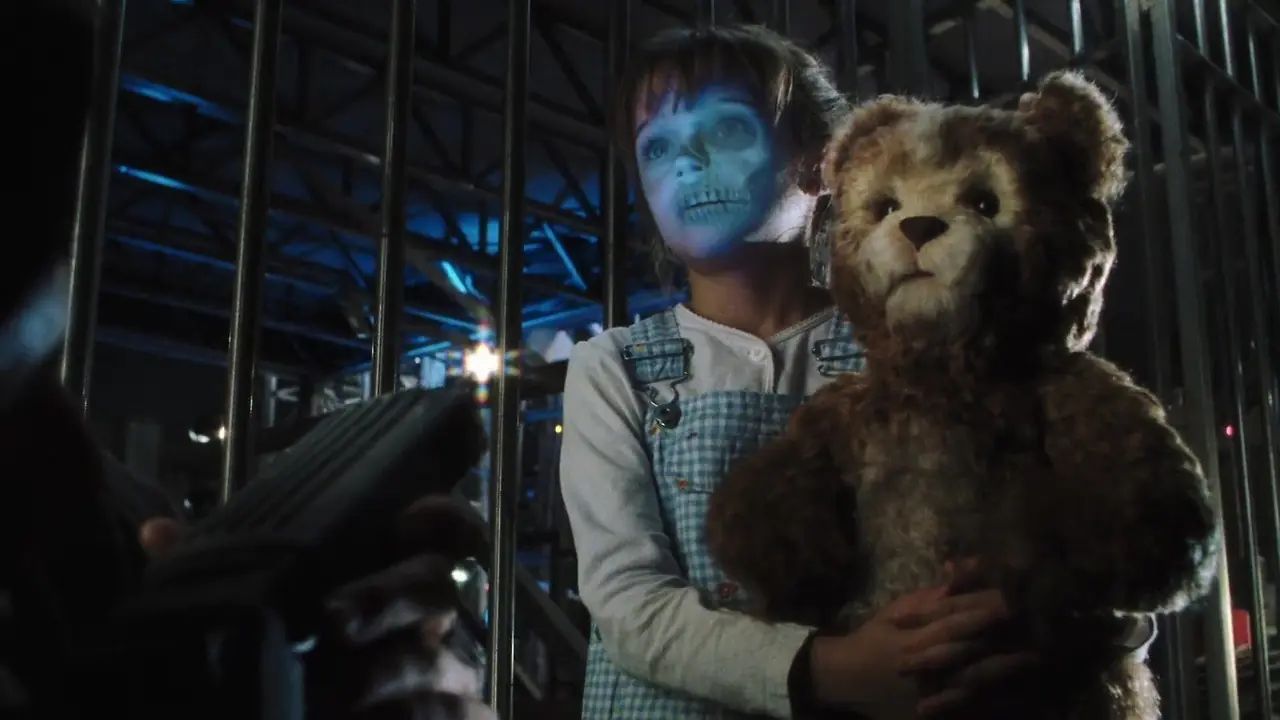
The audience first encounters this apocalyptic reality when David is brutally ejected from the Swintons’ “bubble.” Apart from the forest, the first place he arrives at is the Robot Market. But this place has little to do with a market—in reality, it’s an arena where robots are destroyed in spectacular ways for the entertainment of the crowds, who munch on hot dogs and popcorn. Heffernan rightly describes this location as a visual pastiche evoking associations with witch burnings, slave lynchings, the torture of early Christians, and the persecution of Jews. Crowded into a tight cage, the androids don’t even attempt to resist—they comfort each other, speaking calmly, fully aware that they are about to be annihilated. Would you be so kind as to switch off my pain receptors? one asks just before stepping into the arena. Interestingly, one of the dominant visual motifs of the Robot Market is the American flag, proudly flying over the arena, reflected in the red and white color scheme of the tents and some spectators’ clothing. The strong attachment to national colors, perhaps the most representative expression of nationalism, is here inextricably linked with violence, hatred, and the lowest forms of entertainment.
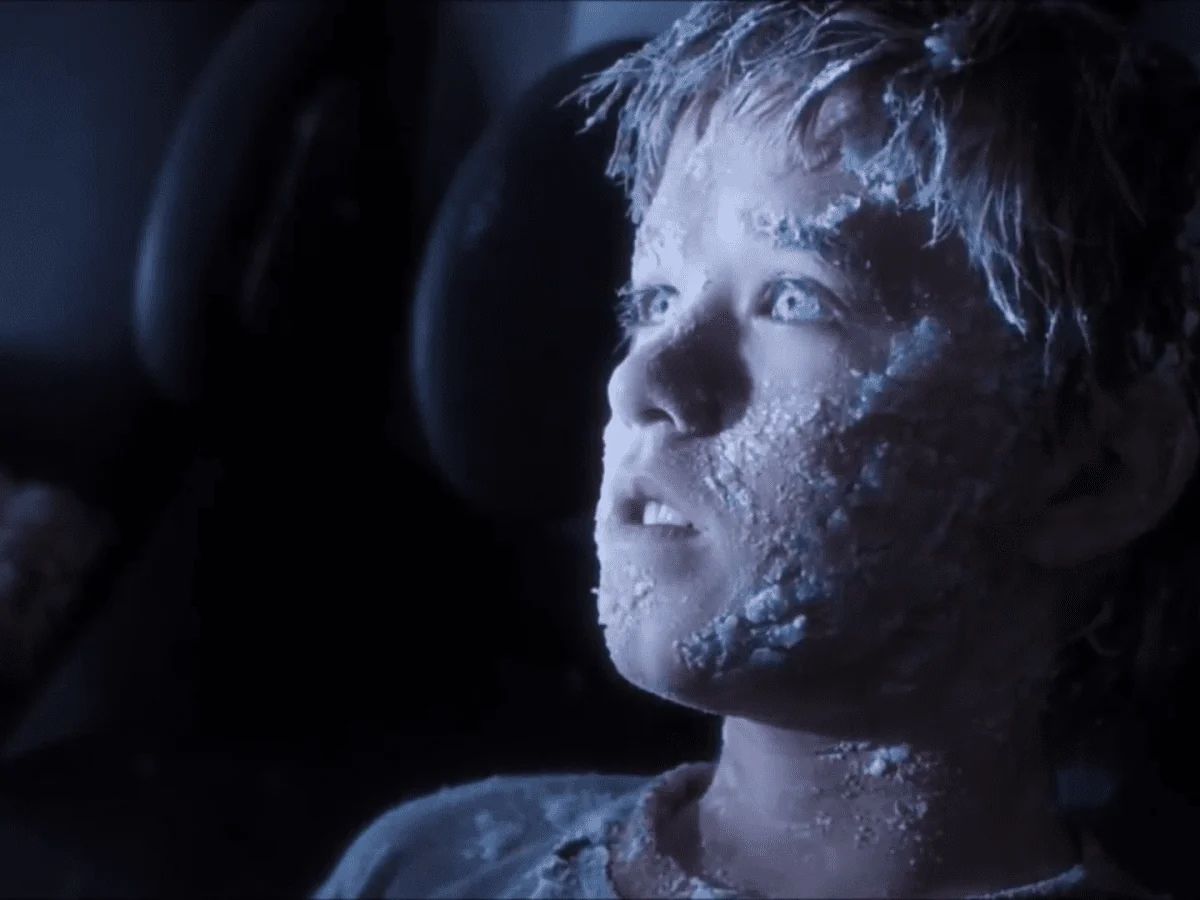
The next location David and his companions visit is Rouge City. The inhabitants of this metropolis have adopted a different approach to the looming climate catastrophe than the people of the Robot Market. They didn’t turn to violence but to hedonism, supported by a full consumerist entourage, manifesting in signs, neon lights, and advertisements surrounding the characters from every side. Even the buildings entice potential customers with their shapes—one of the most striking structures is stylized as a stripper with pink, illuminated breasts.
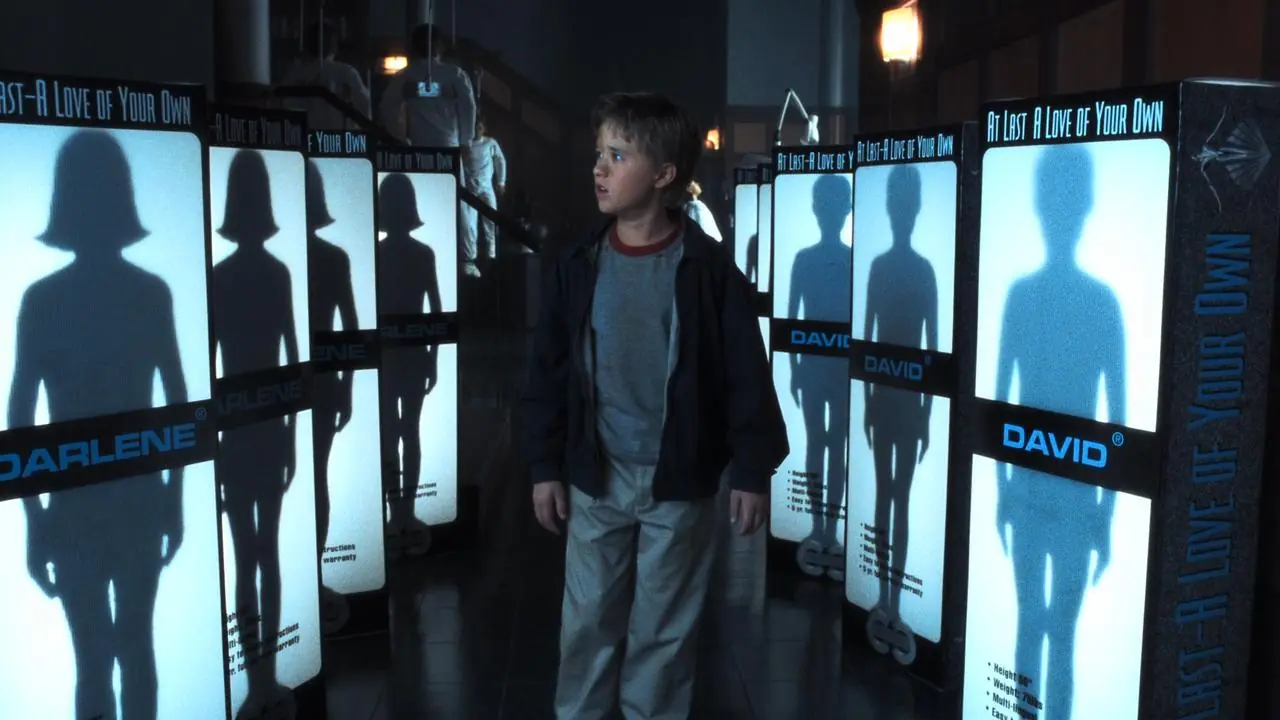
Finally, David reaches Manhattan—the place that most directly reflects the effects of global warming. In A.I. Artificial Intelligence, New York resembles Atlantis, a city engulfed by the ocean. Only the tips of skyscrapers rise above the water, tangible evidence of the metropolis’s former glory. Two things stand out in the context of this place. First, Manhattan is the only location shown on screen where the presence of androids is legally prohibited—when David, Teddy, and Joe cross its borders in a police helicopter-amphibian, the onboard computer screen displays the message: “No Mechs Allowed.” Despite its dire condition, New York functions as a city of elites, where only humans are permitted. Second, despite the natural disaster, some of the buildings still house the headquarters of large, well-functioning corporations. The best example is the Cybertronics skyscraper, where everything operates normally, as if the worldwide catastrophe wasn’t unfolding just outside. Slavoj Žižek’s famous quote fits perfectly here: We can imagine the end of the world, but we cannot imagine the end of capitalism.
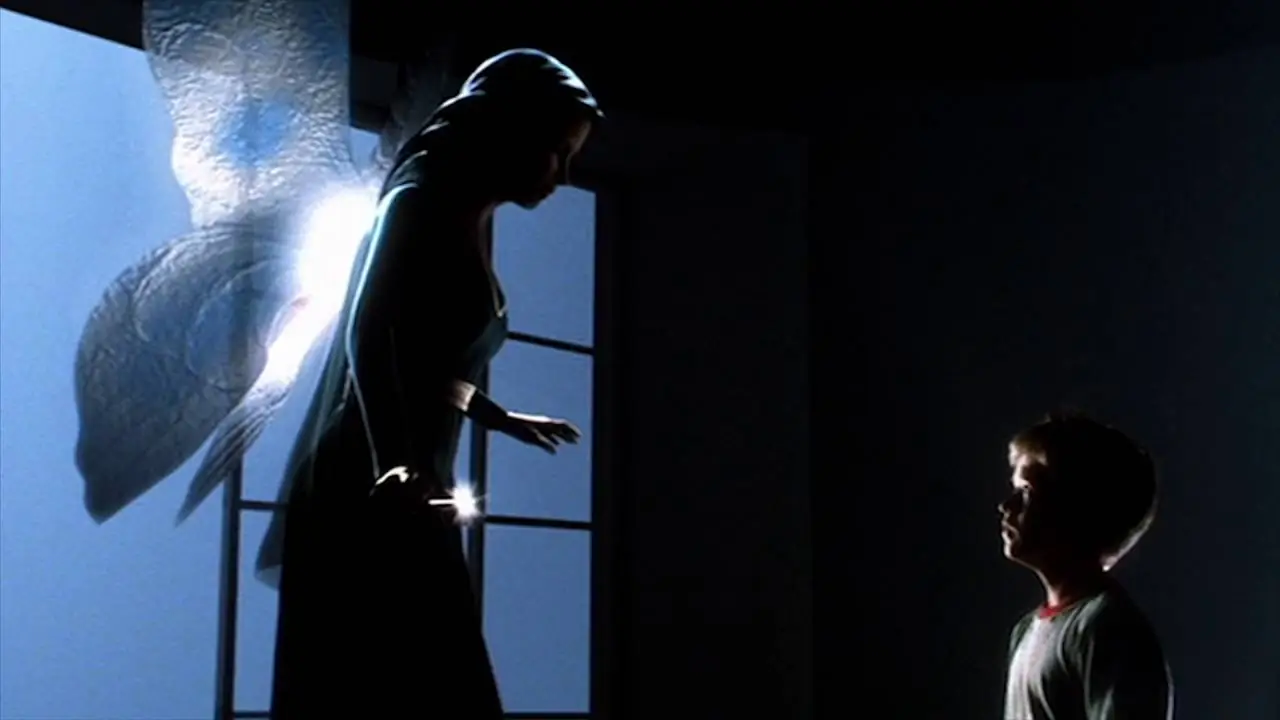
It is at the Cybertronics headquarters that David, seeing dozens of his copies, begins to understand that he is not unique; he is a product, not one in a million, but one of a million. A creation of late capitalism, designed to meet specific human needs. His role is multifaceted. On a global scale, David and his copies are produced so that customers, deprived of government permission, can enjoy a semblance of parenthood. For Monica and Henry, the android’s task is to replace their comatose child, who, as doctors initially claim, is unlikely ever to wake up. It’s also worth considering Professor Hobby’s perspective, as he designs David in the likeness of his deceased son, processing his grief in this peculiar way. As Tim Kreider insightfully observes:
Every character in the film seems programmed like David, obsessed with the image of a loved one and trying to replace that person with a technological simulacrum. Professor Hobby designs David as a duplicate of his deceased child, the original David; Monica uses him as a substitute for her comatose son; finally, completing this sad cycle after two thousand years, David comforts himself with a cloned version of Monica.
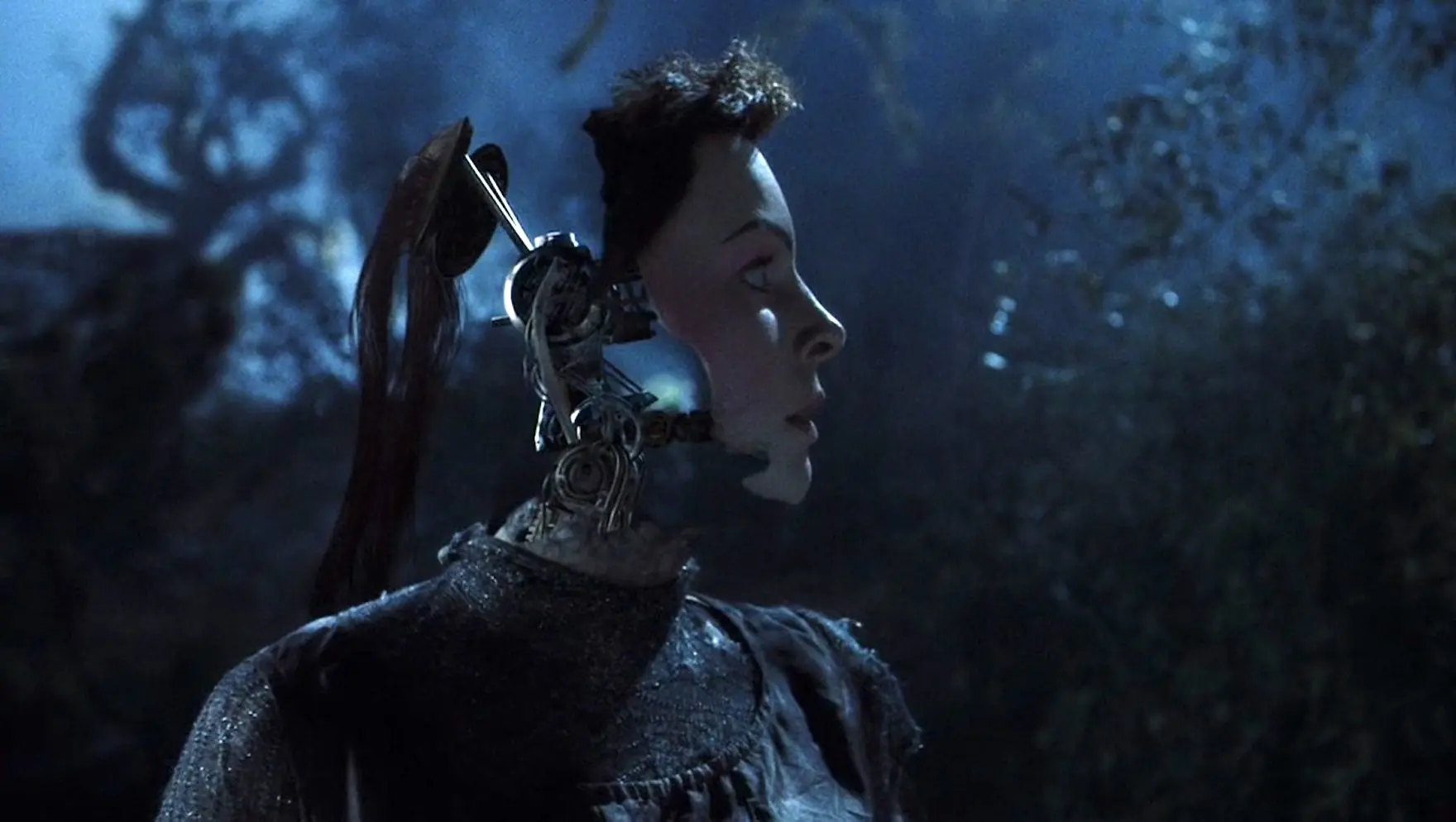
In the character of Professor Hobby, we find another interesting aspect of human nature—the archetypal need to play God. This theme is outlined by Spielberg in the very first scene of the film, excluding the prologue, where the scientist presents David’s concept to his team. After the presentation, one of the women in the room asks a very pertinent question: If a robot will love a human, what responsibility does the human bear towards it? adding less confidently after a moment: This is a moral issue. The professor responds without hesitation: And it’s as old as the world. But God also created Adam so that Adam would love Him. Erich Fromm wrote about the need to imitate God, expressed in the so-called “second creation”:
At first glance, the most striking thing is that man has made himself a god, having achieved the technical ability of the ‘second creation’ of the world, replacing the first creation made by the God of traditional religion. We can also put it this way: we have made the machine a god, and by serving the machine, we have become like gods. The formula we choose matters little; what is significant is that human beings, engulfed in great real powerlessness, imagine that, combined with science and technology, they are omnipotent.
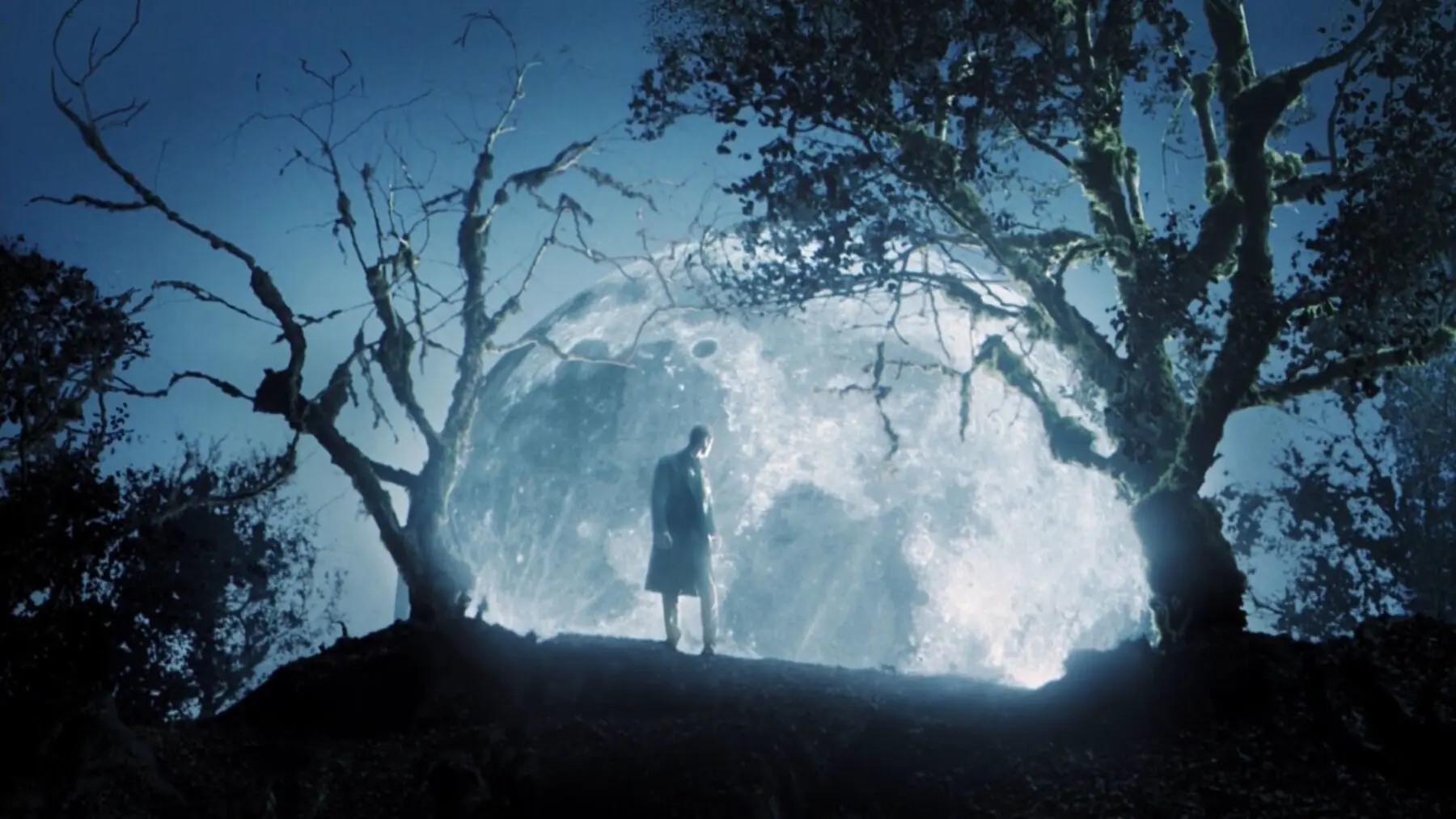
Although androids are, in a sense, proof of the power of the human mind (as noted by the aliens appearing at the end of the film), and their purpose is to serve humanity, society’s attitude toward robots is almost exclusively hostile. Notably, in Spielberg’s film, the perpetrators of violence are exclusively humans, never machines. The postulates of posthumanists, which advocate for “species cosmopolitanism,” meaning the deconstruction of classic anthropocentric oppositions (male/female, human/animal, human/plant, organic/inorganic), have no place in the world depicted in A.I. Artificial Intelligence. People consistently bring these oppositions (especially the last one) to light, thereby creating clear lines of division. Robots are treated by most as antagonized “Others,” relegated to the very bottom of the social hierarchy. David and other mechas can also be interpreted in this light—as dehumanized, mechanized representatives of the social margin, produced by the collision of global capital with climate change; a time when the extreme differences between rich and poor, oppressors and victims, masters and slaves, are an inevitable, harsh reality of a system that values profit above all else and hides behind the lofty idea of progress. Therefore, it is the androids who bear the brunt of human frustration, finding an outlet in xenophobic acts of aggression (Robot Market) and exclusionary legal regulations (the ban on entering Manhattan). The victims, as usual, are representatives of the most defenseless, most oppressed social class, on whom the blame for everything can be placed, though they are, in fact, guilty of nothing. As Gigolo Joe rightly points out in a key monologue that defines the film’s message, delivered just before escaping from Rouge City: They made us too clever, too quick, and too many. We suffer for their mistakes because when the end comes, all that will be left is us.
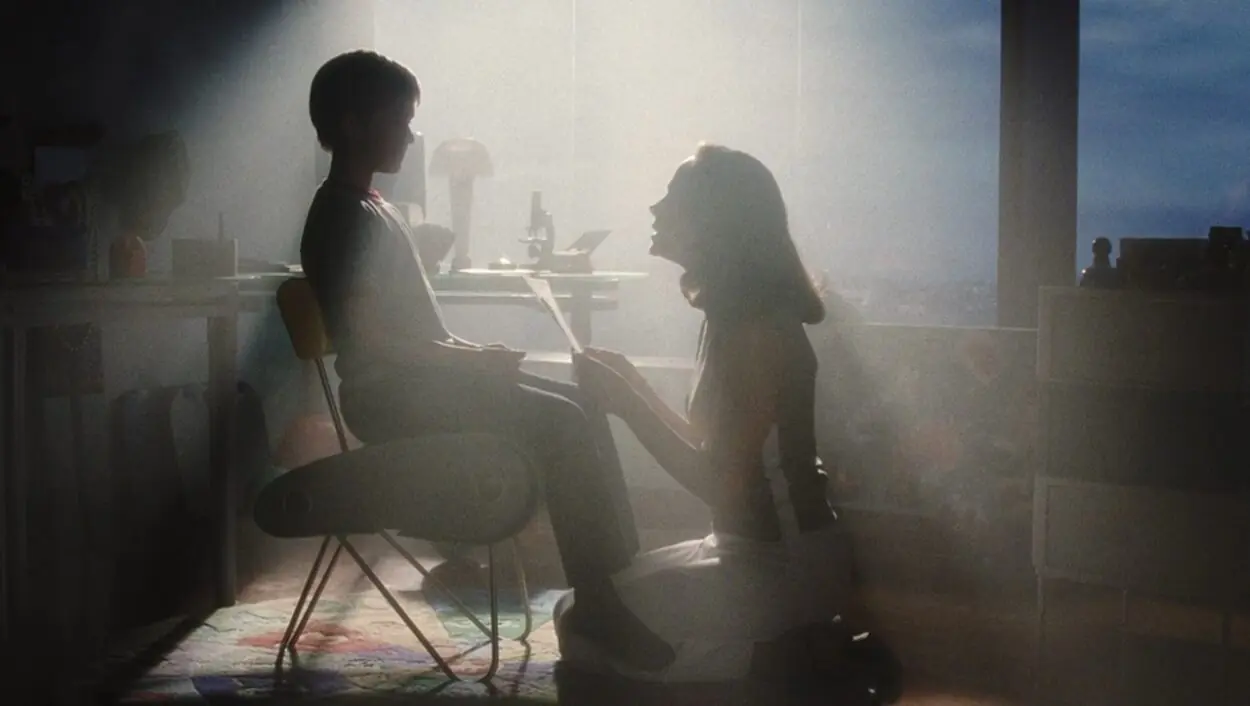
Robots and androids have long been treated in literature and cinema as figures through which the boundaries of what it means to be human can be established—the marginalized, mechanical being often turns out to be more ‘human’ than humans themselves, thereby becoming living proof that the world has gone in the wrong direction. This is precisely the role of David, if we consider humanity, rather than the android, as the main character of A.I. Artificial Intelligence. What does the situation of an innocent robot, who, while searching for love and a way home, encounters only violence, exclusion, and disgustingly instrumental, objectifying treatment from humans, say about the society of the future? What does the image of the planet, as seen in the final minutes of the film—Earth stripped of life, destroyed by a climate crisis, sealed under a thick layer of snow and ice—say about the representatives of our species?
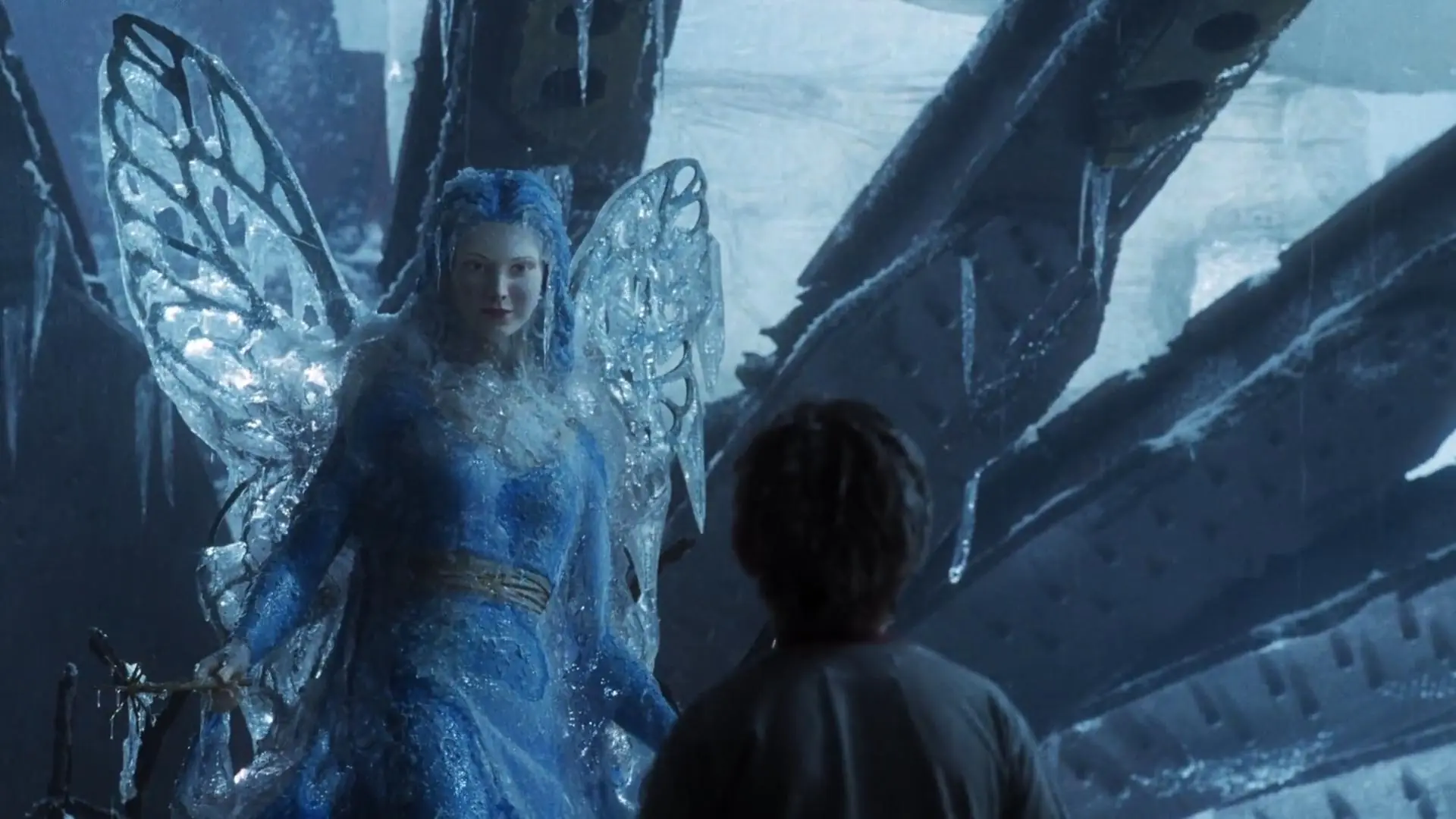
Although the fairy-tale interpretation fits almost perfectly into the poetics of Steven Spielberg’s cinema, and the exceptionally pessimistic social diagnosis, based on a lack of faith in human morality and empathy, has much in common with the themes of Stanley Kubrick’s works, I do not want to definitively attribute which reading of A.I. Artificial Intelligence is the contribution of which of these two directors. The adventures of a mechanical Pinocchio set in an apocalyptic future world represent a concentration of their talents, ideas, and artistic sensibilities. The result of this fusion is an exceptional, multi-layered work, simultaneously universal and terrifyingly relevant science fiction cinema.

